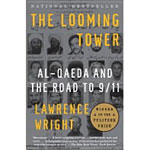A short while ago I asked for your advice on the best book about the 9/11 attacks. Not just any book on the topic, but the best narrative history of the attacks and what led up to them — and one as free as is possible on such a highly contentious issue of political agenda or axe to grind. The overwhelming choice of our readers was Lawrence Wright’s The Looming Tower. I’ve read it now and I can say it definitely lived up to the billing. It’s quite, quite good, though written in a spare, restrained style. It had only occasional moments of sentimentality, which must be a constant temptation on such a topic.
On reading the book and reacquainting myself with many of the details I was struck by the tableau was at the same time so vast and also so small. To a degree the latter is a product of a literary device. We can’t really get our heads around narratives about thousands or millions of people. So the story needs to be whittled down to a few key players. But the 9/11 attacks were on many levels a pretty intimate affair.
You have bin Laden from Saudi, Ayman Zawahiri and his Egyptian group al Jihad, which brought over many of its key soldiers as leaders of al Qaeda. Then there’s Khalid Sheikh Mohammed who originated the idea for the attacks and played a critical role operationally. And he of course was the uncle of Ramzi Yousef, the mastermind of the first attack on the WTC complex in 1993. And Zawahiri’s group al Jihad, though not Zawahiri himself was behind the assassination of Anwar Sadat. Then there’s the blind sheik, Omar Abdel-Rahman, who first appeared as a dangerous but vaguely comical figure in the New York media world surrounding the assassination of Meir Kahane in 1990. But he of course was a key player in the original WTC attack and continued to be one, albeit indirectly and through prison, in the lead up to the 9/11 attacks.
On another level what led to the 9/11 attacks involved virtually every major event in the world over the preceding decades — the fall of the Soviet Union, the invasion of Afghanistan, the first Iraq War, etc. etc. etc. — and millions of people. And the contrast is a classic distinction between very different ways of understanding history and the past. But Wright does capture the simultaneity of the two movements rolling forward, at once intimate and vast.
One more point, one person who follows these topics closely told me she thought the book was better about Zawahiri than bin Laden, though as a general matter she loved the book too. I don’t have enough comparative knowledge to judge. But I would say that Zawahiri comes through more clearly as a person. He does seem to be, as they say, an evil genius. He comes through as a very three dimensional picture. And Wright provides a good explanation of his evolution from ruthless violence to nihilistic, absolutist violence. bin Laden on the other hand remains sort of a mystery, a cipher. Wright’s narrative is never quite clear on whether bin Laden was a useful rich guy whose legend and certain personal qualities made him a useful figurehead for the likes of Zawahiri or whether he really was the driving force of personality in the movement that his jihadi legend suggests. That part of the story still remained elusive for me.
I’m late to the party but I definitely recommend it.







